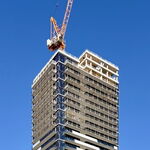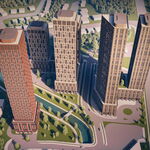Richard White
Senior Member
Toronto currently has 70 subway stations but is expected to open 50 more by the end of 2024
LRT Stops are not subway stations.
We are not opening 50 subway stations in 2024.
Toronto currently has 70 subway stations but is expected to open 50 more by the end of 2024
You can’t just reduce capacity of each arterial by 50% and think that will fly. These are key roads that are already jammed and you want to dedicate 1 lane each way for buses only? No one will support it. No everyone takes the TTC. The only places bus lanes are okayed is where there are 3 lanes available and making 1 be a bus lane is feasible because those roads have spare capacity. In some places like Steeles West, there is space to widen the road to add bus lanes like say from Bathurst to Hilda, which is about a short one mile stretch where Steeles is narrow. The problem there is jurisdiction- widening would need York Region support and perhaps some funding for the capital project.A nice idea, but not nearly wide reaching enough for me. Every single suburban stroad with a TTC line should have bus lanes as an absolute bare minimum.
The timeframe is also agonizing. 2-3 years so every self proclaimed jilted special interest group can cry about how having good bus transit will make their disgusting suburban hell unlivable and probably end up blocking the project altogether? There is no reason this should take more than 6 weeks to implement city wide. Other than the impotency of the modern political process, of course.
As the traffic agents have shown, rules are irrelevant until promptly and visibly enforced because of (principally but not exclusively) auto/truck driver entitlement.Where it would make sense would be to make a street line King have a dedicated ROW and ban parking from all streets with streetcars on it.L within the downtown core - say Bathurst to Jarvis across - King/Queen/Dundas/College and even Bathurst itself.
It definitely won’t but it will improve transit service and speed of service on those two lines. So the riders will see much needed improvements. For Toronto as a whole, the Eglinton line will be transformative due to the sheer length of it. Once it’s extended to Renforth drive and the airport it will be very useful like across the middle of the city.Not sure how opening a couple of suburban LRT lines would make us more like Germany...
Personally I'm hoping ATU 113 goes on strike next time around.
No better way to fund the system then to hold it hostage.
Oh how I miss transit strikes.
Just a little thought. Toronto currently has 70 subway stations but is expected to open 50 more by the end of 2024.
These additions will fundamentally change the rail system from a hub and spoke system to one that begins to operate as a grid. The system will go from 6 TTC/GO interchange stations to 9,
I am not sure about the expansion projects of other NA metros but I have heard that ours is the largest by far. Coupled with the rapid population growth and greatly relaxed zoning in the entire region I see an area that will become fundamentally different than American cities.
Hyperbole for sure! When I typed that the fact that Toronto's streetcar lines often carry more people than many US subway lines was in my head.As noted by others, this is hyperbole.
There is only one U.S. City comparable to Toronto when it comes to transit modal share, and that's NYC. It has been that way for a very long time. Honourable mention to Washington D.C.
Los Angeles has a fairly robust transit expansion program, not quite as large as ours, but substantial:
***
As a side note, Berlin and Toronto already have very similar mode share profiles.
Not any more - the 2011 Act was struck down and not just for CUPE.TTC operators are designated as an essential service; they aren't allowed to strike. If a collective agreement isn't settled at the negotiating table, the matters goes to binding arbitration.
TTC operators are designated as an essential service; they aren't allowed to strike. If a collective agreement isn't settled at the negotiating table, the matters goes to binding arbitration.
That was struck down a few months ago. They won back the right to strike.
https://www.cbc.ca/news/canada/toronto/ttc-workers-right-to-strike-ontario-court-1.6838150
I fear for the operators' safety if a strike does happen. Last time there was a strike, people were assaulting them when they returned to work. That was over a decade ago and people have gotten much more violent now..
On what basis do you offer that conclusion? Please provide evidence.
Have you seen the looney tunes using the system as a shelter now?
I've seen people with obvious issues try to start a fight with other people on the subway.




